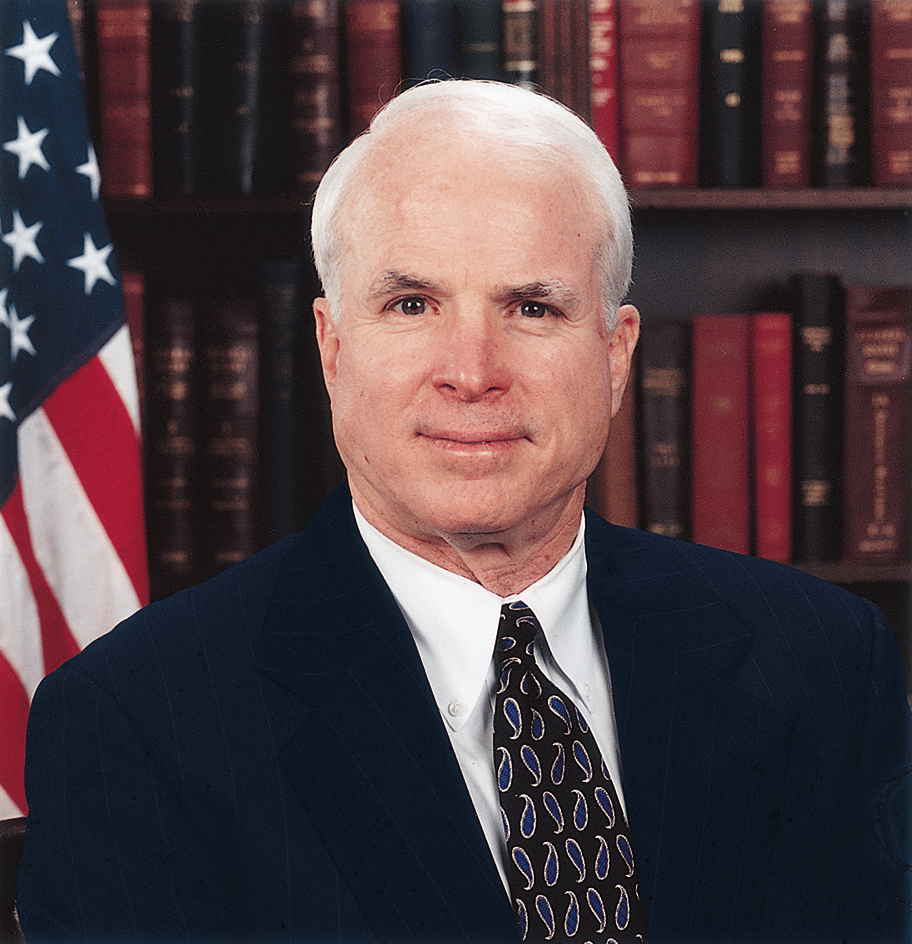McCain, John (1936-2018), a United States senator from Arizona, was the Republican nominee for president in the 2008 election. McCain lost the election to Senator Barack Obama of Illinois. McCain had also sought the presidency in 2000, but he failed to win his party’s nomination. He was a member of the U.S. Senate from 1987 until his death.

Early life.
John Sidney McCain III was born on Aug. 29, 1936, in the Panama Canal Zone, where his father was serving in the U.S. Navy. His family soon moved to Alexandria, Virginia, where he attended school. In 1958, McCain received a bachelor’s degree from the United States Naval Academy. Upon graduation, he entered the Navy and served as a fighter pilot. In 1967, during the Vietnam War (1957-1975), his plane was shot down in Vietnam, and he was held prisoner there until 1973.
Among other military decorations, McCain received the Bronze Star and Silver Star medals for his service and bravery and a Purple Heart medal for wounds he suffered during combat. In 1973 and 1974, McCain attended the National War College. From 1977 to 1980, he served as director of the Navy Senate Liaison Office.
In 1965, McCain married Carol Shepp, a model from Philadelphia. The couple had a daughter, Sidney. McCain also adopted two of Carol’s children from her first marriage, Doug and Andy. In 1980, the couple divorced, and McCain married Cindy Hensley, the daughter of a wealthy Phoenix beer distributor. The couple had three children: Meghan; John IV, commonly called Jack; and James, called Jimmy. The McCains adopted a fourth child, Bridget, from an orphanage in Bangladesh.
Political career.
In 1981, McCain retired from the Navy with the rank of captain and moved to Arizona, his wife’s home state. In 1982, he was elected to represent Arizona in the United States House of Representatives. McCain was reelected to the House in 1984. In 1986, he ran for the U.S. Senate and won election to his first term as a senator. He took office in 1987.
In the Senate, McCain became known as a political maverick (independent thinker) who rarely allowed party loyalty to determine his stand on issues. He cosponsored several major pieces of legislation in the Senate with liberal Democrats.
McCain and Senator Russell Feingold, a Democrat from Wisconsin, cosponsored legislation to encourage limits on campaign spending. Congress approved a version of the bill in 2002. In the early 2000’s, McCain worked closely with Senator Edward M. Kennedy, a Democrat from Massachusetts, on an immigration reform bill. The bill provided for border enforcement measures and a temporary worker program. It also would have allowed millions of illegal immigrants to seek U.S. citizenship after meeting certain conditions. The Senate passed the proposal in 2006, but in the House, conservative Republicans prevented voting on the bill.
In 1999, McCain began campaigning for the Republican nomination for the 2000 presidential election. In early nominating contests, McCain competed well with Texas Governor George W. Bush, the eventual winner. But he dropped out of the race in March 2000.
In April 2007, McCain announced his intention to seek the Republican nomination for president in the 2008 election. In 2008, McCain defeated his main opponents, former governors Mitt Romney of Massachusetts and Mike Huckabee of Arkansas, for the Republican nomination. In September, at the Republican National Convention in Saint Paul, Minnesota, delegates nominated McCain for president and Alaska Governor Sarah Palin for vice president. The Democrats nominated Obama for president and Senator Joe Biden of Delaware for vice president. In the presidential election in November, Obama and Biden defeated McCain and Palin.
McCain wrote three autobiographical works—Faith of My Fathers (1999), Worth the Fighting For (2002), and The Restless Wave (2018). He wrote each book with Mark Salter, his long-time aide and chief of staff. Other books McCain and Salter co-wrote include Why Courage Matters: The Way to a Braver Life (2004) and Hard Call: Great Decisions and the Extraordinary People Who Made Them (2007).
In 2017, McCain was diagnosed with glioblastoma, a form of brain cancer. In July, he underwent surgery to remove a blood clot associated with the cancer. McCain died on Aug. 25, 2018.
In 2021, the Senate confirmed McCain’s widow, Cindy McCain, as U.S. ambassador to the United Nations Agencies for Food and Agriculture. She served under President Joe Biden, a longtime Senate colleague of her husband’s.
See also Palin, Sarah Heath.
